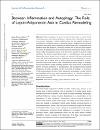Between Inflammation and Autophagy: The Role of Leptin-Adiponectin Axis in Cardiac Remodeling
| Author | Kamareddine, Layla |
| Author | Ghantous, Crystal |
| Author | Allouch, Soumaya |
| Author | Al-Ashmar, Sara |
| Author | Anlar, Gulsen |
| Author | Kannan, Surya |
| Author | Djouhri, Laiche |
| Author | Korashy, Hesham |
| Author | Agouni, Abdelali |
| Author | Zeidan, Asad |
| Available date | 2021-10-26T09:10:51Z |
| Publication Date | 2021 |
| Publication Name | Journal of Inflammation Research |
| Identifier | http://dx.doi.org/10.2147/JIR.S322231 |
| Citation | Kamareddine L, Ghantous CM, Allouch S, Al-Ashmar SA, Anlar G, Kannan S, Djouhri L, Korashy HM, Agouni A, Zeidan A. Between Inflammation and Autophagy: The Role of Leptin-Adiponectin Axis in Cardiac Remodeling. J Inflamm Res. 2021;14:5349-5365 |
| Abstract | Cardiac remodeling is the process by which the heart adapts to stressful stimuli, such as hypertension and ischemia/reperfusion; it ultimately leads to heart failure upon long- term exposure. Autophagy, a cellular catabolic process that was originally considered as a mechanism of cell death in response to detrimental stimuli, is thought to be one of the main mechanisms that controls cardiac remodeling and induces heart failure. Dysregulation of the adipokines leptin and adiponectin, which plays essential roles in lipid and glucose metabolism, and in the pathophysiology of the neuroendocrine and cardiovascular systems, has been shown to affect the autophagic response in the heart and to contribute to accelerate cardiac remodeling. The obesity-associated protein leptin is a pro-inflammatory, tumor-promoting adipocytokine whose elevated levels in obesity are associated with acute cardiovascular events, and obesity-related hypertension. Adiponectin exerts anti-inflammatory and anti- tumor effects, and its reduced levels in obesity correlate with the pathogenesis of obesity- associated cardiovascular diseases. Leptin- and adiponectin-induced changes in autophagic flux have been linked to cardiac remodeling and heart failure. In this review, we describe the different molecular mechanisms of hyperleptinemia- and hypoadiponectinemia-mediated pathogenesis of cardiac remodeling and the involvement of autophagy in this process. A better understanding of the roles of leptin, adiponectin, and autophagy in cardiac functions and remodeling, and the exact signal transduction pathways by which they contribute to cardiac diseases may well lead to discovery of new therapeutic agents for the treatment of cardiovascular remodeling. |
| Language | en |
| Publisher | Dove Medical Press |
| Subject | inflammation autophagy leptin adiponectin cardiac cells |
| Type | Article Review |
| Pagination | 5349-5365 |
| Volume Number | 14 |
| ESSN | 1178-7031 |
Files in this item
This item appears in the following Collection(s)
-
Biomedical Sciences [682 items ]


